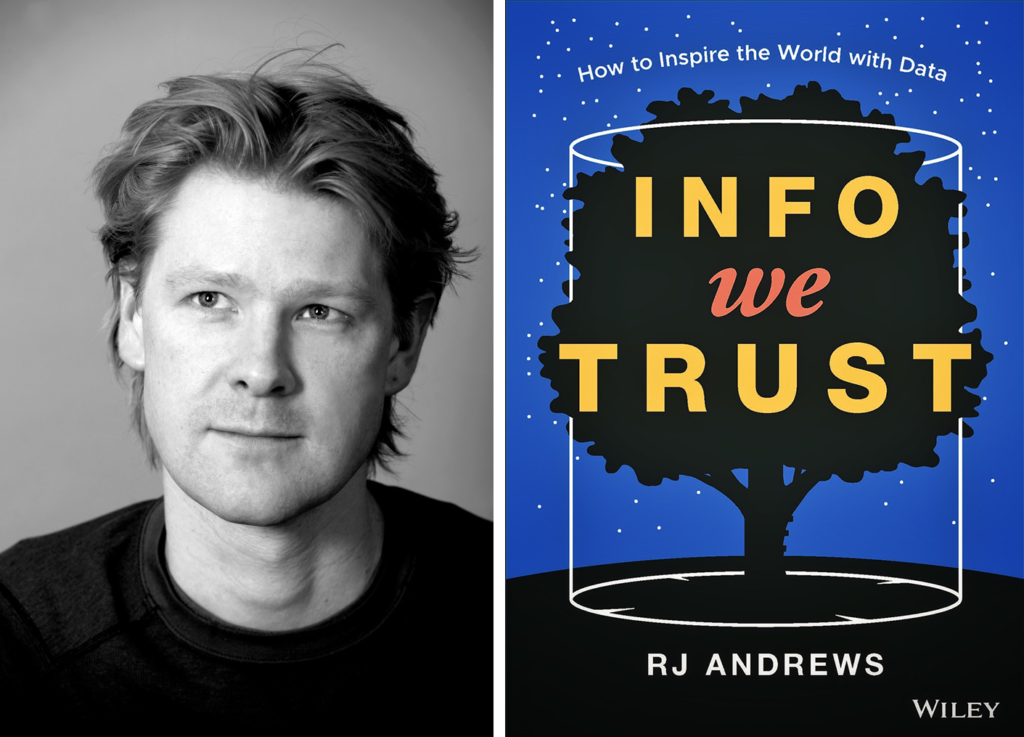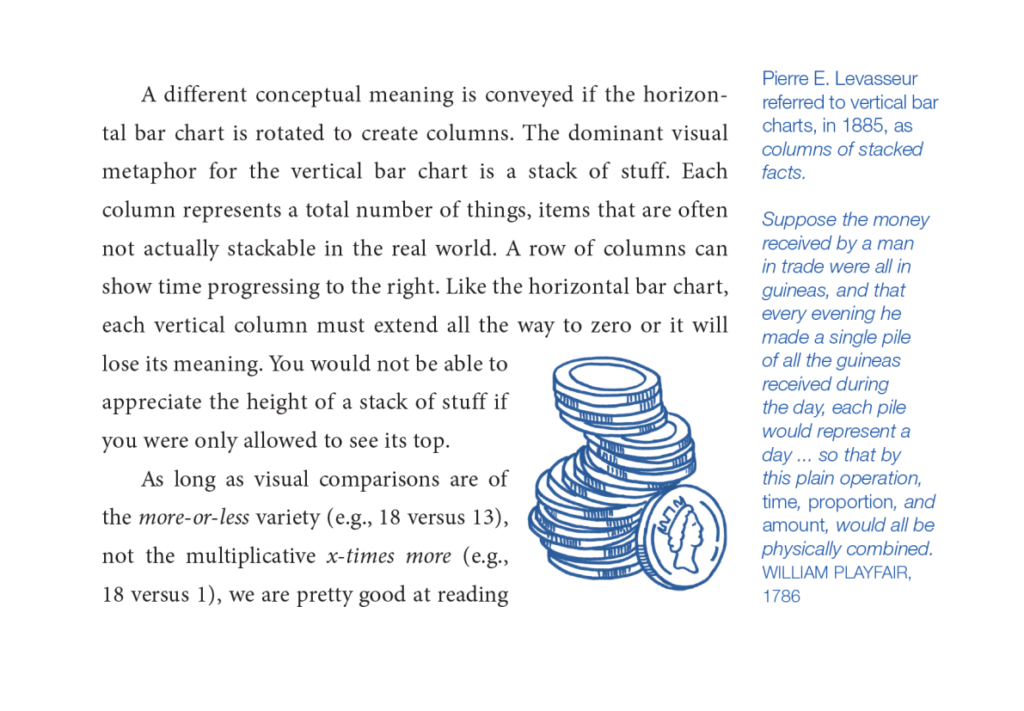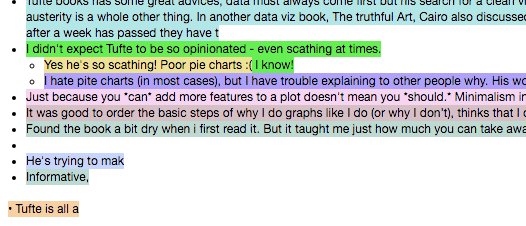Read “Practical Charts” by Nick Desbarats with us!
October 14th, 2024
7 min
This article is brought to you by Datawrapper, a data visualization tool for creating charts, maps, and tables. Learn more.
“A voyage through the craft of data storytelling”

Remember last summer? That was a good summer. Coincidentally, we started a book club that summer. The Data Vis Book Club. After reading four books (Edward Tufte, Tamara Munzer, Alberto Cairo, Cole Nussbaumer Knaflic), we had a little winter break.
Here is the good news: The winter break is over! We start reading again. I’m happy to announce that the 5th book we will read is RJ Andrews’ just-freshly-out-in-the-stores-book “Info We Trust”.
This book could be the first and last book you read about data storytelling. Whatever knowledge you arrive with, you are bound to find new meaning.” – RJ Andrews
Let’s see which meaning we will find! We will discuss Info We Trust on Tuesday, the 12th of March 2019 at 5 pm UTC here:
→ notes.datawrapper.de/p/bookclub-infowetrust
Like Tamara, Alberto & Cole last year, RJ will join our live conversation to answer questions we had about the book.
RJ Andrews is a “data storyteller” who created the site infowetrust.com in 2013 as a data adventure. You might know his site for the History of Infographics.

A man and his book.
Or you might know him for his recent essays about creating Info We Trust: In the last few weeks, RJ wrote excellent articles about writing, deciding on a cover and the layout and creating all the illustrations for his book by hand (crazy!). You will find more of this making-of at the end of his book.

RJ wrote Info We Trust “for people who believe in pursuing new and wonderful ways of looking at the world.” He promises “that reading Info We Trust will embolden you to do great things with data.” But we shouldn’t mistake that book as a practical “How to create good charts” guide. RJ does explain practical topics in data visualizations like color, uncertainty, comparisons, scales, and distributions. But he also talks about metaphors, our models of time, trust and truth.
The book that seems closest to RJ’s Info We Trust is Alberto Cairo’s The Truthful Art that we read a few months ago, although there’s more aspiration, more “grandness” in Info We Trust. The many illustrations throughout the book play a big part. At first sight, they make RJ’s book more beautiful & coherent, and at the same time they somewhat break it away from everyday work of a data vizzer. I’m excited to find out what you all think about the illustrations.

Twelve pages from Info We Trust, stolen from here.
Read RJ’s book with us if you want to
Don’t read RJ’s book if you want to

An example of RJ’s writing style.
1. You get RJ’s book. Ask your local library to order it for you, buy it, borrow it from a friend, ask around on your preferred social network.
2. We all read the book. That’s where the fun begins! Please mention @datavisclub or use the hashtag #datavisclub if you want to share your process, insights, and surprises – I’ll make sure to tweet them out as @datavisclub, as motivation for us all. Please note: Info We Trust is a dense book. March seems far away, but you might want to start soon-ish, to give RJ’s book the time it needs & deserves to have an effect on you.
3. We get together to talk about the book. This will happen digitally on Tuesday, the 12th of March 2019 at 5 pm UTC over at notes.datawrapper.de/p/bookclub-infowetrust. It won’t be a call or a video chat; we’ll just write down our thoughts. 5 pm UTC is 10 am on the US west coast, lunchtime (1 pm) on the US east coast, 5 pm for readers in the UK & Portugal, 6 pm for most other Europeans and 10.30 pm in India. The discussion will be structured into three questions and a Q&A with RJ Andrews.
During the conversation, I’ll ask these three questions in the following order:
1 What was your general impression of the book?
2 What was most inspiring, insightful & surprising about the book? Explain how a sentence, chapter or the whole idea of the book challenged something you assumed.
3 Having read the book, what will you do differently the next time you visualize data?
For each question, you can prepare an answer in 1-2 sentences and paste it into the notes once I ask the question during the conversation. If you can’t find the time to prepare anything at all just come by and chat – we’ll quickly get into discussion mode.
After answering the three questions, we’ll get to the highlight: RJ will join approx. 45min after the book club has started, to answer questions we have about the book. Whilst reading the book, make notes about what you’d like to ask him!
Here’s a short FAQ for you, in case you have more questions:
So what will happen, exactly, during the book club?
A digital book club is a new experience for many of us. See how our book club discussions have looked like in the past:

You can also read the review of the first book club, to learn how people found the experience.
Why don’t we do a call? Why the notepad?
Because it works well for introverts & people who prefer to stay anonymous in the discussion. Plus, the documentation of our meeting writes itself. But if you’d like to organize a call, go ahead! I’m sure that lots of people would be interested. I’m happy to support you.
I can’t make it on this date / this time.
Do you live in New Zealand and it’s the middle of the night (sorry😢)? Do you have a lunch date? Vacation? Need to bring the kids to bed? No problem! The conversation will be archived in the notes and can still be extended over the next day(s).
Will there be local meetups?
I’d be thrilled if you’d organize a meetup in your city! If you look for attendees, make sure to mention @datavisclub, and I’ll spread the word. However, I won’t organize a local meetup in Berlin this time.
I’m very, very much looking forward to reading “Info We Trust” with all of you. If you have any more questions, write in the comments, at lisa@datawrapper.de or to Lisa / the Datawrapper account on Twitter. Also, make sure to follow @datavisclub, to stay up-to-date and get a dose of motivation from time to time.
Comments